Our Scottish Drama Writers' Programme with paired eight writers with a Scottish independent production company to support them in developing an original TV script aimed at ±«Óãtv One or ±«Óãtv Three. It recently concluded with script read-throughs as part of the .
We asked one of the writers, , to describe the process from the inception of his idea right through to the final read-throughs. May has written a fantastic piece for us which articulates how an idea can be seeded, germinate and take root over many years. He explains why it is so important for British TV not to stereotype black stories as "urban" stories and how his meetings with the different companies involved allowed his idea to develop and grow, to focus and find its correct shape. It's also a great insight into what it means to work as a writer in the development of a TV project.
Read May's post below.
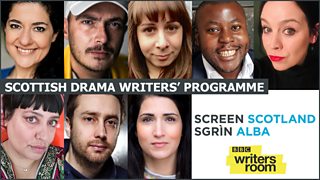
Scottish Drama Writers' Programme (l-r top row Anita Vettesse, James Price, Emma Lennox, May Sumbwanyambe, Jenni Fagan, bottom row Raman Mundair, Rob Drummond, Maryam Hamidi)
Spring 2002. A Black teenager is working on a spring-onion farm in a small town called Spalding. At the side of the farm where he is working, he’s surrounded by other British people doing the same job as he is. Except for him, everyone on this side of the farm is white; everyone working to earn the wage of £10 per crate that they fill – cash in hand – a dream job for someone wanting to earn a bit of extra pocket money whilst studying in 6th Form.
One morning, on the other side of the farm, it seems more workers have suddenly turned up. None of them are white. None of them seem to speak English. These workers are kept very separate from the original group. It’s hard to tell where these workers are living - perhaps in the back of the lorry that is now a permanent fixture on the roadside? That must be where they live, sleep, eat and everything else…. How do they wash in such a place? The pace they are working at is incredible, and dangerous – whilst on the “British” side of the farm, people go up one by one to get individual crates at their own pace. On the “other” side of the farm they are brought in by forklift; the sound of it approaching triggers a race between the “Others” – from a distance it almost looks like a game between them. But it isn’t a game. They are deliberately being given too few crates….. who would do that?
Another worker on the farm speculates to the young boy, that she reckons they are probably only getting paid a penny a crate: the young boy looks at them more closely now. He feels sick to his stomach. There’s something about the way they run towards the incoming crates. The forklift comes in closer and closer. The crates haven’t even touched the ground and they’re fighting each other. They're tearing each other limb from limb; with their fingernails - they’re digging their fingernails into each others’ skin; clawing at each other to get one of those crates.
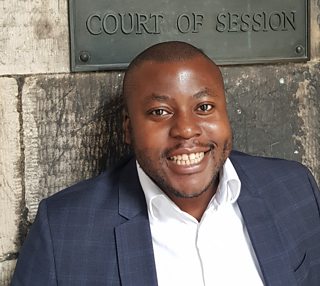
May Sumbwanyambe
No one on the “British” side asks any questions, not even the teenage boy. Everyone keeps their heads down and minds their own business, children and adults alike. But as the days go on, that young boy can’t help but look across the farm, more and more into this other field. Even when he goes home, it’s in the back of his mind. He starts to dream about it. It’s several years before he would go on to study law at university, and at 16 years old he can’t quite articulate, not even to his parents, what it is that is making him feel so unsettled.
Looking back, what he was probably beginning to question – as he stared down the barrel of the manic logic of globalisation, and the system everyone was very much part of - is, if we benefit tangibly from the exploitation of others who are weak, are we morally implicated in their predicament? Why, he might have asked – at least on this farm – are those basic rights of human existence (that are supposed to be part of our British value system), why are they seemingly confined to the so-called “civilized” parts of our society that are wealthy enough to afford them?
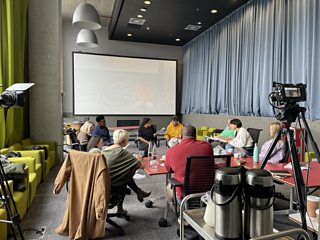
Scottish Drama Writers' Programme read-throughs rehearsal with May in attendance
Fourteen years later and now 30 years old, ‘After Independence’, the play I had written about post-colonial justice, set in Zimbabwe, has just won the Audience Award. I receive a congratulatory e-mail from Angela Galvin and Audrey McFadden, the recently appointed team who are busy setting up the new ±«Óãtv Writersroom department in Glasgow – they say that the former Head of ±«Óãtv Writersroom, Anne Edyvean, asked them to get in touch and that it would be great to meet me over a coffee. After being one of the winners of the inaugural ±«Óãtv script room competition in 2012, I had been anticipating such a meeting. A few weeks later we meet and discuss my interest in writing for TV and radio. The meeting leads to immediate introductions to radio producers at ±«Óãtv Radio 4. As the years pass we all keep in touch and become friends.
It would be four years later, in August 2020, before Development Producer, Angela Galvin, gets in touch, via email, to see if I have time for a quick chat and catch up about a ‘Television Opportunity’. On the arranged Zoom call, we discuss an invited opportunity for writers to participate in ‘The Scottish Drama Writers' Programme 2020. Angela tells me that I have, “been selected to pitch because we (the Drama Commissioning/Screen Scotland and ±«Óãtv Writersroom Scotland) feel you have demonstrated both passion and great talent in your previous narrative work, but we are aware you have yet to make your mark with your own authored television piece”.
Three weeks later I finished writing my single page drama pitch idea for ±«Óãtv One, about and the impact he had on the in Scotland in the 1840’s. I submitted this along with my drama spec script.
A couple of weeks after that I receive another call from Angela. The good news is that I have been selected for an interview and the panel really likes my spec script. The more complicated news is that, although the panel liked my Frederick Douglass pitch, the strong feeling is that Commissioning Editor, Gaynor Holmes is not currently looking to develop a period piece. I have a week to come up with another idea.
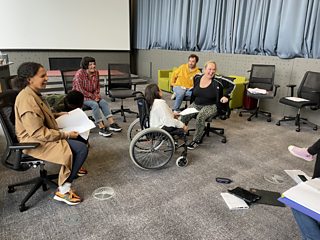
Scottish Drama Writers' Programme read-through rehearsals
Days pass and my mind keeps drifting back to that 16-year-old boy stood on the farm in Spalding. Somewhere in my subconscious, is an unresolved question – something that might be ripe to be tackled through the process and prism of drama. Around a week later, sat in my kitchen, staring into a computer screen and my laptop's camera, with Angela, Audrey, Gaynor and Screen Scotland producer Leslie Finlay looking back at me, I pitch them an idea titled, ‘Queen of the Beggars’.
‘Queen of the Beggars’ is a story about an ordinary farmer/mother/daughter called Queenie Swana, who, under pressure, makes a bad choice for good reasons when she hires “illegal” workers to work on her farm (named the Beggars). At this early stage I knew that I wanted it to be a family drama which explores the legacy of what is passed down within farming families for both good and bad, and also how difficult it is to remain indifferent to the suffering of “illegal workers” when being both directly confronted by it and potentially complicit in it.
In the ±«Óãtv interview I talk about my interest in expanding the range of stories of Black people in Britain. My idea was still pretty rough around the edges, having come up with it so quickly, but as I began to talk about why I was passionate about telling this story and why I felt it was so important that this story was told, I began to flesh out ideas that had clearly been troubling me for a long time, particularly the strong tendency in British TV to stereotype black stories as “urban” stories. For me that doesn’t show the whole picture; there are plenty of black, middle-class families, like the ones I wanted to explore in ‘Queen of the Beggars’, who face many different issues than gun and knife crime and living on an estate.
As I spoke, It felt like something electric happened in that Zoom meeting. Something authentic was emerging from within me – issues that I had been wrestling with for nearly two decades were suddenly crystal clear. The response from Gaynor, Leslie and the team was enthusiastically positive. They told me that I didn’t need to create another written pitch document, and that the combination of what I had articulated in the meeting and my spec script would be powerful enough if I was put forward as one of the shortlisted writers whose work would be submitted to the eight Independent TV producers (Indies) taking part in the programme. A week later Angela wrote to inform me that I was officially one of nine writers to proceed on to further interviews in October 2020.
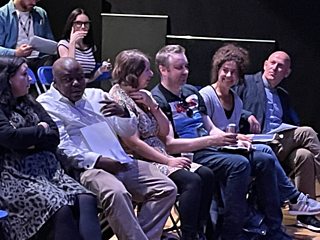
The writers at the Scottish Drama Writers' Programme read-throughs at the Royal Lyceum Theatre studio in Edinburgh
The next part of the process seemed relatively straight forward – each of the eight Indies would pick two potential writers they would like to be paired with, and the writers were asked who they would ideally like to work with too. Finally, the ±«Óãtv would place eight writers with eight Indies and announce the results in December 2020.
The tone and feeling of the interviews with the Indies felt a lot like my initial meeting with the wider ±«Óãtv team. I’d start by discussing my spec script and move onto a deeper conversation about the story I wanted to pitch to them. The best thing about these interviews with the Indies was the immediate feedback I was getting from them every time I pitched the idea. It gave me lots of opportunities to test out new parts of the idea and keep building upon them.
The first meeting I took was with . In its rawest form, what I had originally pitched to Gaynor was a story that deliberately muddied the lines between good and bad; right and wrong. In this new meeting I tried to build on the way I presented the narrative so that the story felt like it was driving towards that larger question of how do we live with the choices that we make in our lives, especially the ones that impact our families? I designed the story focus around how hard it is to be a good person in modern day society, and how people who are often viewed by society as “bad” can do good things and vice versa.
Next up were . Taking on feedback from my previous meeting, I tried to improve the set-up of my story, to increase the stakes and make it easier for an audience to engage with my characters and their through-lines.
With my emphasis started to shift much more onto character. Taking a little more time in my pitch to build up the back-story behind the protagonist made her more relatable and emphasised that she was not just someone who was lucky enough to own/manage a large plot of land.
The story felt like it started to coalesce even better with this change in a way that really benefited my conversation with . Now my plot had a protagonist that had an active secret. I continued to develop this in the pitch by broadening my view beyond the earliest parts of the story, so that her secret would be one that gets bigger and bigger, but also one that makes the audience ask themselves what would we do in her shoes? That personal secret had to be something impossible to keep truly secret in a small community. It was something that would eventually not just be personal, but familial before other people in the community would be dragged into it too - everyone needs to be compromised by it.
In my next Zoom conversation, with – I focused a little more on the world I was trying to build for my characters. I tried to pitch this in a succinct way, without me waffling on - the key to this was focusing on the three generations of women (grandmother, mother and daughter) living on the farm. My aim was to create a really interesting and complex world by focusing on the contemporary relevance underpinning the idea: that through these generations we could see how Brexit has had a crippling effect on Scotland’s rural economy, particularly in relation to access to casual, seasonal workers from Europe. By focusing more on the three individual POV’s of my characters, I felt I was able to communicate my idea in a way that was very specific and resonant with ideas of modern slavery, morality, and human rights etc.
I continued this pattern of revisions so that, by the time I pitched to Tod Productions I noticed that what didn’t seem to be cutting through in previous pitches was the importance of mental health and wellbeing to the story. I worked to reframe the beginning of the script so that it was clearer to the audience that the precarious and stressful nature of trying to keep the farm working in a “hostile environment” was putting my protagonist’s wellbeing at stake. I paralleled this with the impact on mental health/wellbeing that was happening to the human beings, subjected to the UK ±«Óãtv Office’s “Hostile Environment” policy.
delivered some great, straight-forward feedback at the end of our meeting. Perhaps it helped that George Aza-Selinger and I had already worked together on many projects over the years, when he was previously the Literary Manager at the National Theatre of Scotland. Because of this, I began to further interrogate the hook/inciting incident of the series, to ensure that it gives power to the main character and hooks the audience in early.
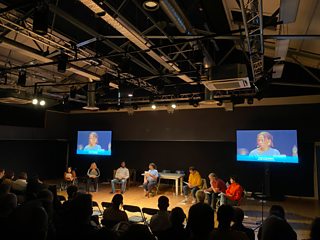
Scottish Drama Writers' Programme read-throughs. Lois Chimimba bringing May's character of Queenie to life.
By the time I sat down with Marcus Wilson / Kathryn Shrubb () I felt very well versed with what I was trying to say with this piece, that had grown and developed throughout all of the previous conversations.
What struck me immediately about my conversation with Two Rivers was they were the first company that didn’t want to change the original idea. In hindsight, with all the experience they have, they both knew that the process would see the idea naturally grow and change for the better – but it was more than just that. They were also the only company that already had plans to make a story about farming. Everything just seemed to gel in that initial conversation. Our visions about what this story should be and why this story needed to be told aligned perfectly.
We talked about our desire to go beyond the sense of the script being merely an exploration of how people survive under increasingly difficult circumstances. With Marcus and Kat’s guidance, I started to think more practically about how to build the pressure on the protagonist in the earliest parts of the drama so that her decision to use illegal workers really made sense. Two Rivers’ focus on detail, characters and relationships really suited me. Although I could articulate well the important and relevant issues underpinning this story, the team at Two Rivers were very persuasive that the story needed to arise from and be driven through character, rather than the issues imposing on the story. We needed to interrogate these characters and their relationships to one another to find the most specific, believable and personal way of telling the story. I immediately knew this strategy would allow me to catapult the characters into an unexpected world and ask uncomfortable questions about illegal workers, modern slavery and moral responsibility. I knew I hadn’t quite found the perfect shape of the story yet and needed to pin down exactly what the story was. I had no doubt, call it instinct, that Kat and Marcus could deliver me there. Covering so much ground the way that we did within that short conversation, ticked a huge box for me, in terms of what I was looking for in an Indie. And this final meeting set the tone for how me, Marcus, Kat (and also Annabel Macleod, Charlotte Daniel and Callum Ferguson) would go on to work together for the next 18 months.
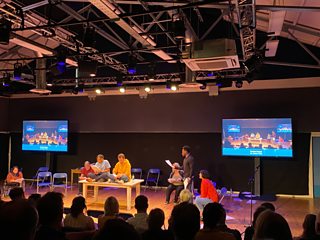
The Scottish Drama Writers' Programme read-throughs
In early December, Angela wrote to tell me that several of the Indies had picked me as the person that they wanted to work with. That was a fantastic feeling. All of them would have been a joy and pleasure to work with but in my head I had already decided that Two Rivers would be the best option for me. Happily, they were one of the companies that had chosen me too.
What followed over the next 16 months was me writing (and then re-writing several times) the treatment and first episode of the show. Two Rivers surpassed what I had expected of them in every way. Their attention to detail in terms of developing the idea as well as my needs as a developing screenwriter was phenomenal. Whether that was through having someone on the team dedicated to research, Marcus and Kat’s constant involvement in every single meeting, making arrangements for established screenwriters to be my mentor, organising interviews with farmers and lawyers, and team trips to spend time on farms in Arbroath where our story is set. More than that though, it was their patience, alongside constant belief and encouragement, that meant even in those harder moments of learning, I never felt overwhelmed or alone.
All this was supplemented by the ±«Óãtv who provided me with the brilliant as a script editor all the way through the process, whom I could go to for advice and feedback. Getting the opportunity to have group conversations with writers such as , and , as well as development producers like was also a real highlight of the programme. Their dedication to their craft and humility and generosity in being open with us about the ups and downs of their own journeys felt incredibly empowering and inspiring.
The unexpected part about working in television was just how many different voices are involved. It’s a real skill to be able to try and give various producers and commissioners what they want but also stay true to your original vision. In theatre you don’t have to take so many people along on the journey with you. I remember a particularly useful meeting about halfway through the process – we had “finished” the treatment and it was the first time that the team at the ±«Óãtv had a chance to weigh in on what we had done before we went to script. Gaynor Holmes came with so many brilliant ideas to that meeting; it felt so rewarding and encouraging to see how deeply engaged everyone in that Zoom room was with the story that we were trying to tell.
As we progressed on to script, that meeting encouraged us to think about how the story we were telling could offer both the “high-stakes thriller experience”, that the ±«Óãtv were asking for as well as deliver the Breaking Bad type “character study” that was driving my vision. As we developed the script we really began to tease these issues out. For the high-stakes thriller experience to land the way we wanted it to, we needed to speak to contemporary issues; namely Brexit, inflation and the cost of living, in a nuanced, dramatically satisfying and surprising way. The thriller experience needed to sit alongside the family saga, “The King is dead/Long live the king” aspect that Gaynor so passionately noted in our meeting. To borrow a phrase from my colleague Marcus, “we needed to find a way to have our cake and eat it”.
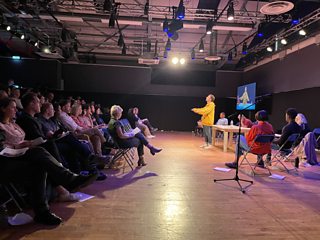
The Scottish Drama Writers' Programme read-throughs
The most familiar part of this whole process for me was the build-up to the end of programme readings. I was extremely happy when I heard that my friend would be directing. She is someone with whom I had wanted to work for a long time, and after this experience I’m sure she is someone I will work with again in the future. The amount of detail she and the brilliant actors (, , , , , and) found in the script extract in only two hours rehearsal time was phenomenal. It’s only when you get the story up on its feet and hear actor’s interpretations that you really start to understand the little details and nuances contained within your script; the places where you need to ramp up tension; the little complexities that are built into your character that start to make them come alive and the small places that your story is really affecting that you may have previously underestimated.
Seeing Lois Chimimba bring Queenie to life from the page was particularly useful to understanding the character’s voice going forward. The immediate response from the invited industry audience was gratifying. The general tenor of which was, “May, they better bloody make this”. “Yes,” I thought to myself, (many times), “they really better!”. 😉 Also being from Edinburgh, I have long wanted to make my Edinburgh debut – so the fact that Audrey and Stephanie organised for the reading to take place at the Lyceum Theatre during the Edinburgh TV Festival, made it all just that little more special. It was also great to see the brilliant and varied work that the other writers have been developing. Jenni “I’m the best dissector of the dead on this damn island” Fagan, is cooking up something pretty special with her piece “Lilith”.
The only bittersweet moment about the reading was that it marked the moment where Charlotte Daniel (one of the Two Rivers team) would be leaving us to join the team at Lime Pictures. Charlotte made invaluable contributions throughout the year to the development of this idea and has been a really brilliant friend. She will be missed. And I’m sure one day (if I’m lucky) she’ll be my boss!
On the train back from Edinburgh to Glasgow the next morning I bumped into Gaynor and Leslie. They were pleased with the reading and enthusiastic about seeing the whole script. I was… hungover! It felt like a lovely postscript to a brilliant event.
What happens next? Well, as I write this blog post, myself and my Two Rivers family are reworking the pre-title sequences - we want those opening five pages to really encapsulate what the series is about. I’m sure we’ll go through a few more rounds of this to perfect it.
Whether or not we get that coveted opportunity to develop this series further, in many respects I feel I’ve already won. I’ve enjoyed every moment of this process; I’ve learnt such a wide array of screenwriting skills that I didn’t previously have in my locker; I’ve made lifelong friends in my colleagues, and at the age of 36, I finally have answers for that 16 year-old, black boy staring across at an adjacent field, filled with “others” and contemplating the manic logic of globalisation. I can now face myself, in the mirror, and tell that boy, inside me, that our values are not defined by what we will tolerate being done to ourselves; they are defined by what we will tolerate when it is done to others. I know one thing for sure, the chance to be able to continue on this journey and get the opportunity to ask that question, to a ±«Óãtv One audience, through the medium of a compelling drama, is truly the stuff that dreams are made of. So, as I come to the end of this drafting process, I will cross my fingers, close my eyes, and hope that the TV gods, along with the gods of luck, timing and personal tastes are on my side. And then I’ll press send.
TIPS for success when submitting to ±«Óãtv Writersroom:
If you have made it this far in reading my blog post, my only tip is this: read lots of screenplays and watch lots of television. There is no meeting you will have in TV where having reference points and a mutual shorthand language with the other people in the room is not going to be to your advantage. Don’t fall into the trap of thinking we learn how to be a writer by writing. We learn by reading and watching critically. Evaluating the decisions that other writers have made. The two scripts that I found myself reading over and over again when I was writing my pilot were Sally Wainwrights’s magical openings to ‘Happy Valley’ and ‘Last Tango in Halifax’. I’ve never met Sally Wainwright but she is definitely now one of my heroes.
Explore our Script Library and read many more ±«Óãtv TV Drama scripts
